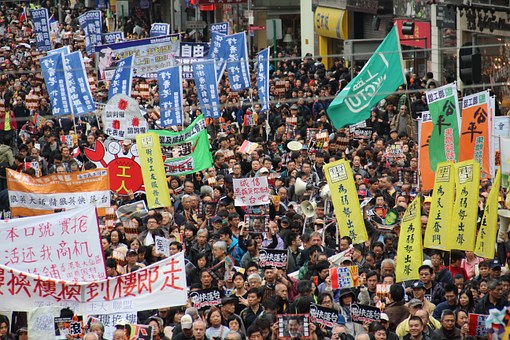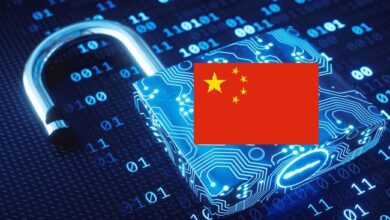Technology Law / Cyber Law
China’s National Security Law- The Swan Song of Hong Kong’s Freedom Struggle

Poetically, “Swan Song” refers to the final performance or activity of a person’s career. The reference could not have been more appropriate to describe the current plight of Hong Kong.
The National Security Law (NSL) that was unanimously passed by China on the midnight of 30th June 2020 has been called “the end of Hong Kong” by the critics. This Beijing-backed law has the powers to arrest and punish protesters, disqualify pro-democracy legislative candidates, charge oppositions, and also has the jurisdiction over cases and secret trials without the jury or a national security agency.
The law is receiving a lot of backlashes as it seems to be vague and broad and applies to anyone on the planet. The Chinese authorities are said to have forced these laws without any transparency or accountability and it now stands as a threat to the “national security”.
According to the news reports, the Hong Kong government as well as the public weren’t informed of the text of the legislature until after its enactment. It has supposedly bypassed the Hong Kong’s local legislature and was passed just a few weeks after its announcement.
This article discusses the history of Hong Kong and then straightaway dwells into the main topic of discussion I.e.; the National Security Laws curated for Hong Kong by China. The research discusses the law in detail and the controversies related to it and what is its impact on Hong Kong. It further discusses the situation of the people of Hong Kong and China’s idea behind implementing this law. The main emphasis of this article is on the impact of NSL on the Tech Companies in Hong Kong. Finally, the researcher’s resonation with the topic is provided in the critical analysis at the end of this paper.
History
The British ruled Hong Kong until 1997, after which, the territory was given to China under the condition that it retains some autonomy, including its economic system, for 50 years i.e., till 2047 under the rule known as “one country, two systems”.
The Hong Kong Basic Law came into force in 1997, and requires the Hong Kong national security law, (officially called the Law of the People’s Republic of China on Safeguarding National Security in the Hong Kong Special Administrative Region[i],) as a piece of national security legislation under its Article 23. This law also specifies that it has to be enacted by the Hong Kong Special Administrative Region.
An attempt was made in 2003 by Hong Kong to fulfill legislation under Article 23 but did not succeed due to the protests.
In June 2020, the Chinese Standing Committee of the National People’s Congress enacted the law instead of the Hong Kong Legislative Council.
The common point between the previous attempt and the current enactment is the timing of the occurrence. The 2003 attempt was accompanied by the SARS outbreak and the current enactment was in the COVID-19 era. This is adding up to the backlash among people.
What is the New Law and Why is it Controversial?
China had stepped in and announced the new law, containing 66 Articles, in May and put it into effect on the 1st of July.
This new law criminalizes four activities: “secession, subversion, organization, and perpetration of terrorist activities, and collusion with a foreign country or with external elements to endanger national security”. Specific offenses like damaging government buildings and lobbying against the Chinese government are also included in this law and the National Security Committee can investigate and prosecute the violators.
Where does Hong Kong stand?
This new law was enacted an hour before midnight on 30th June which was also an hour before the 23rd anniversary of the city’s handover to China from British rule.
The judicial powers lying with Bejing has stirred protests with respect to the freedom of speech. In response to this, Chinese officials have promised stability.
The new law has a few key highlights:
- A maximum sentence of life in prison for crimes of secession, subversion, terrorism, and collusion with foreign forces and long-term imprisonment for 10 years will be awarded for all the offenders in all categories;
- Companies can be fined if convicted under the law;
- The law also states that the national security agency office established by Beijing, and the Hong Kong office can request to pass some cases to be tried in mainland China. Further, these offices would not be under the jurisdiction of the local authorities. Beijing had also stated that it will only have that power over a “tiny number” of cases;
- In addition, Hong Kong will have to establish its own national security commission to enforce the laws, with a Beijing-appointed adviser;
- Hong Kong’s chief executive, Carrie Lam will have the power to appoint judges whose term will be limited to one year, to hear the national security cases. A few of these cases might be held in the absence of juries in Hong Kong if they contain any national secrets. However, the verdict and the eventual judgments would be in the presence of the public;
- Bail would not be granted to the accused “unless the judge has sufficient reason to believe they will not continue to commit acts that endanger national security”;
- People suspected of breaking the law can be wire-tapped and put under surveillance;
- The law also stated that “the Hong Kong government has no jurisdiction over the national security agency in Hong Kong and its staff when they are discharging duties provided in this law”. And in case of conflict between Hong Kong and a Beijing law, the latter would be prioritized;
- Management of foreign non-governmental organizations and news agencies will be strengthened;
- The law will also apply to non-permanent residents and people “from outside [Hong Kong] who are not permanent residents of Hong Kong”;
- Criminal acts under the category of foreign collusion include: inciting Hong Kong residents’ hatred of the Hong Kong or Chinese government, electoral manipulation or sabotage, and sanctions against Hong Kong or China;
- Damage caused to public transport and certain public facilities would be classified as terrorism under the law;
- Anyone organizing or taking part in the acts aimed at splitting the country with or without the use of violence would be considered to commit an offense and the convicted or the guilty will not be permitted to stand for public office in Hong Kong elections; and
- This new law permits China to take over take over the prosecution process from arrest to trial for complicated foreign interference cases, “very serious” cases, and cases where national security faces “serious and realistic threats”.
The plight of People in Hong Kong
The people of Hong Kong fear the loss of their state’s freedom with the enactment of this new law. Beijing has said Hong Kong should respect and protect rights and liberties while safeguarding national security.
It is clear that the law will have a severe impact on freedom of expression, if not personal security, on the people of Hong Kong.
Professor Johannes Chan, Legal Scholar, University of Hong Kong
There have been apparent reports that the people opposing the new laws will be disqualified from holding a public office or taking part in the state elections. Many are also afraid Hong Kong’s judicial independence will be eroded and its judicial system will look exactly the same as mainland China’s. The city is the only common law jurisdiction in China.
“Effectively, they are imposing the People’s Republic of China’s criminal system onto the Hong Kong common law system, leaving them with complete discretion to decide who should fall into which system,” says Professor Chan.
Impact on the Tech Companies
The new law curated by China is said to have implications for privacy, cybersecurity, data, and trade issues.[ii]
- Effects on Privacy and Data Access
Not long ago, this year a discussion on the Amendment of the Personal Data (Privacy) Ordinance was started by the Hong Kong Govt. This proposal caused a public outcry over the privacy breach and cyberbullying. The legislative proposal also includes a new provision to require online platforms to facilitate law enforcement’s access to cyber offenders’ identities and personal information when approached by regulators with reasonable evidence.[iii]
Now that the NSL is introduced, this amendment has to be interpreted in a different political and legal context. There are chances that the introduction of this new law might speed up the drafting process of the amendment and hence, facilitate wider law enforcement access to personal data in Hong Kong.
In case the Privacy Ordinance is not mended, the Chinese security will, however, be involved in enforcing the current Personal Data Ordinance and leveraging the national security law to broaden and deepen their reach.
- Impact on Data Flow
The enactment of the new NSL would raise concerns regarding the implementation of the Australia-Hong Kong bilateral free trade agreement (FTA). Due to the wider law enforcement access to data, HK’s chance of committing free data flow agreements in the future will be limited. This limitation can be in the context of the FTA, the Asia-Pacific Economic Cooperation (APEC) platform, or the Comprehensive and Progressive Agreement for Trans-Pacific Partnership (CPTPP).
- Cybercrime, cybersecurity, and Censorship
There are chances of Beijing imposing pieces of China’s Cybersecurity Law in Hong Kong. This would provide the Chinese law enforcement with access to data, security, and localization requirements for mainland citizens’ and organizations’ data, along with critical information infrastructure protection measures.[iv]
The Chinese authorities will cautiously proceed on the issue of content censorship within Hong Kong to avoid the local and geopolitical conflicts. They will also be aggressive in their approach to enforce Hong Kong-related content rules across media, social networks, Over The Top (OTT) services, and online gaming platforms behind the Great Firewall.
- Impact on Trade and Export Control
After the enactment of NSL, the U.S. Department of State has concluded that HK does not have a significant autonomy anymore and has initiated the process of reviewing HK’s special economic status with the US. Under this status, special preferential tariff rates were enjoyed by Hong Kong in its exports to the US while the latter had zero tariff rates.[v]
The new law will lead to the suspension of the existing licensing exceptions for the export, re-export, and transfer of certain controlled technology products to the region.
The application of U.S. export control rules in Hong Kong is one element of the special treatment review.
Presently, the status of a “cooperating country with multilateral export control mechanisms” is enjoyed by Hong Kong and it receives favorable treatment from the U.S. export control regime. Chinese and foreign companies have taken advantage of this special treatment to process dual-use technology deals they are not able to handle in other jurisdictions.[vi]
If the special trade status is revoked by the US, many American companies currently trading goods between Hong Kong and the U.S., leveraging favorable tariff rates, would lose that benefit and be subject to the tariffs imposed on both sides of the U.S.-China trade war.
Companies that have previously been leveraging Hong Kong’s favorable export control status may now have to carefully review their current compliance policies and procedures for importing and exporting controlled technology items subject to the EAR (Export Regulation), and carry out the necessary changes to prepare for the potential disruptions to their operations in Hong Kong. This may include reviews of existing contractual obligations for the supply of technology by building in the additional time needed to obtain export licenses and/or seeking partnerships with local technology suppliers in order to maintain service levels for Hong Kong customers.[vii]
China’s Intention Behind Curating these New Laws
China’s main motive behind making these new laws is for Beijing to exercise control over the jurisdiction of Hong Kong. Hong Kong was under British control and was handed back to China in 1997. There was a unique agreement which was a mini-constitution which was called the Basic Law of “one country, two systems’’.
According to the above agreement, Hong Kong had to enact is own national security law – as set out in Article 23 of the Basic Law – but it never happened because of its unpopularity.
Hong Kong’s Basic Law says Chinese laws can’t be applied in Hong Kong unless they are listed in a section called Annex III. However, a few laws of uncontroversial nature and foreign policy are contained in that list.
These laws can be introduced by decree – which means they bypass the city’s parliament.
They are supposed to protect certain freedoms for Hong Kong: freedom of assembly and speech, an independent judiciary, and some democratic rights – freedoms that no other part of mainland China has.
Critical Analysis
In my personal opinion, it is a recognized fact that it is the government’s right and duty to protect its citizens and it differs for every country. But this cannot be used as an argument to refrain people from expressing their political views or to exercise such other rights that are protected under international legal standards.
There have been a lot of speculations that this new national security law is aimed at opposing the people’s need for democracy. This has also drawn huge crowds on to the streets and they might be punished for protests under this new national security law. According to the news reports, there have been instances of violence between the police and the demonstrators. More than seven politically active groups have been dissolved within a week of the enactment of the law.
It is quite evident that the Hong Kong national security law is just another example of a government using the concept of “national security” to repress political opposition, running the risks for human rights defenders, critical media reporting, and the people at large. The law has genuinely failed in its attempt at protecting national security as well as safeguarding human rights. The grave consequences of opposing the law have created a sense of fear among the people. They are not aware of what constitutes the offense of “endangering national security” due to the vagueness of the law. Hence, everyone is at the risk of a criminal prosecution, removal to the mainland, or deportation from the territory.
This article can be cited as:
Pratyusha Ganesh, China’s National Security Law- The Swan Song of Hong Kong’s Freedom Struggle, Metacept – InfoTech and IPR, accessible at https://metacept.com/chinas-national-security-law-the-swan-song-of-hong-kongs-freedom-struggle/ .
References:
[i] Lam, Carrie (30 June 2020). “Promulgation of National Law 2020” (PDF). The Government of the Hong Kong Special Administrative Region Gazette (in Chinese). 24 (44). Retrieved 1 July 2020.
[ii] Xiaomeng Lu, What Does Hong Kong’s National Security Law Mean for Tech Companies, The Diplomat, June 12, 2020,https://thediplomat.com/2020/06/what-does-hong-kongs-national-security-law-mean-for-tech-companies/
[iii] Xiaomeng Lu, What Does Hong Kong’s National Security Law Mean for Tech Companies, The Diplomat, June 12, 2020,https://thediplomat.com/2020/06/what-does-hong-kongs-national-security-law-mean-for-tech-companies/
[iv] Xiaomeng Lu, What Does Hong Kong’s National Security Law Mean for Tech Companies, The Diplomat, June 12, 2020,https://thediplomat.com/2020/06/what-does-hong-kongs-national-security-law-mean-for-tech-companies/
[v] Xiaomeng Lu, What Does Hong Kong’s National Security Law Mean for Tech Companies, The Diplomat, June 12, 2020,https://thediplomat.com/2020/06/what-does-hong-kongs-national-security-law-mean-for-tech-companies/
[vi] Tamer A. Soliman, Andrew Olmem, Elizabeth E. Owerbach, Duncan A. W. Abate, Duane W. Layton, President Trump Revokes Preferential Treatment for Hong Kong, July 16,2020, https://www.mayerbrown.com/en/perspectives-events/publications/2020/07/president-trump-revokes-preferential-treatment-for-hong-kong
[vii] Gabriela Kennedy, Karen H. F. Lee, Cheng Hau Yeo, The Chamber of No Secrets: What Tech and Data/Content-Driven Companies Need to Know about the Hong Kong National Security Law, July 28, 2020, https://www.mayerbrown.com/en/perspectives-events/publications/2020/07/the-chamber-of-no-secrets-what-tech-and-data-content-driven-companies-need-to-know-about-the-hong-kong-national-security-law




